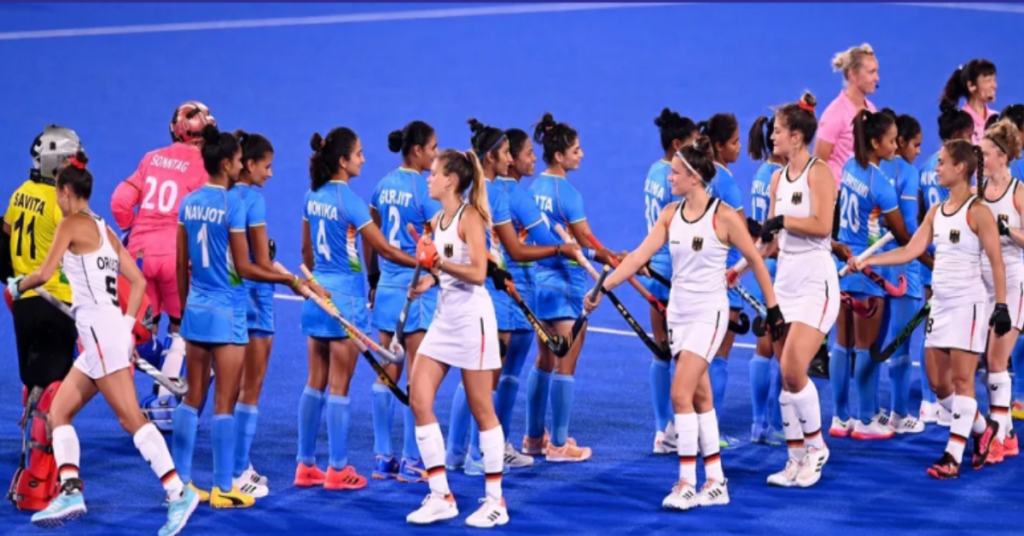Talent wins games, but teamwork and hard work win championships. Indian women hockey team scripted history.
When the final hooter sounded at the Oi Hockey stadium in Tokyo on Monday, the entire nation has erupted in joy. Indian women hockey team successfully scripted the history. They were through to their first Olympics semi-final, beating three-time champions Australia. Entering the Olympics itself had been quite of a journey. Their fighting spirit has overcome three big losses in the round-robin league stage (to Netherlands 1-5, Germany 0-2 and Great Britain 1-4) only to secure a 1-0 win against Ireland and a 4-3 win against South Africa speaks volumes about their mental toughness and determination.
But the trials and tribulations, this extraordinary team has gone through in this journey to Tokyo is as fascinating as their win.
Setbacks for the Indian Women Hockey Team:
In April this year, just when the Indian Women Hockey Team was on the right path towards their Olympic Campaign, COVID19 struck for the first time. Six players tested positive for COVID19 including the captain Rani Rampal and were sent into two-week isolation. Moreover, captain Rani also suffered from Typhoid and was in and out of hospital for several days. This caused a lot of stress and affected the team’s practise sessions a lot. Another big blow for the team was their most experienced player Vandana Katariya’s father Nahar Singh’s death in Haridwar due to COVID19. The most difficult decision for her was to skip the funeral of her father, who stood by her side through all the societal pressures to let her pursue her passion. But none of these dampened the grit and determination of these girls in Tokyo.
The stories of struggles of these gritty girls are not limited to the events just before the Olympics but go way back to their childhood. Every member in the 18 member Olympic Squad has an extraordinary journey of overcoming innumerable hurdles behind her. Players like Neha Goyal, Nisha Warsi, Sushila Chanu, Deep Grace Ekka, Udita and Lalremsiami have all faced tremendous financial hardships before they found success in the Indian team. They all are from similar socio-economic backgrounds and have taken up hockey to reduce the financial burden on their families and make a place for themselves in society.

Neha’s motivation to pick up the hockey stick was to get a pair of shoes for free from her school. Lalremsiami’s family encouraged her to take up hockey for the simple reason that their daughter would get a better life if she took up sports as a career. Goalkeeper Savita Punia’s grandfather encouraged her to take up the sport to ensure that she would not be restricted to the household chores in Haryana, where the patriarchal mindset is dominant. On the other hand, midfielder Nikki Pradhan was not even able to visit her village Hesal in Jharkhand during her hockey breaks, as her village is in a Naxal stronghold.
Also Read: Indian Women creating history at Olympics 2020
Captain Rani Rampal is the daughter of a cart-puller and has seen severe poverty. Despite her hardships, she emerged as a winner by her persistence with a coach in the nearby training ground to allow her to play hockey. She started playing hockey with a broken stick in salwar-kameez as she could not afford anything better. Salima’s family, who lives in Badki Chapar village, had to invest in a generator to avoid frequent power outrages. This helped the residents of the village to watch their daughter and her team play in the Olympics. Well, in spite of all these struggles, our girls fought their way through to the top.
The Coach & the Challenges:
While these girls have shown tremendous courage, determination and passion for Hockey, the role of their coach Sjoerd Marijne, a Dutchman is also very significant. He brought stability to the team which helped the team immensely towards their victory in Tokyo Olympics 2020. For him, changing the eating habits of the players was the most challenging part as these girls with diverse backgrounds — from North-East to South India – have such divergent food cultures and eating habits. As athletes, they need to have a high protein intake.
However, in India there is a concept of vegetarianism and most of the usual diet is high in carbs even for those eating non-veg food. Considering all these restrictions and yet to ensure the players were getting enough nutrients, he made individual eating plans. All such attention to detail has helped the team a lot. Sjoerd’s own journey itself was an extraordinary one as he was no high-flying hockey player or a coach before he took over this role.

The Victory:
Before closing, let us also look back at the Indian women’s hockey teams journey to date. In the 2002 Commonwealth Games led by captain Suraj Lata Devi, the team entered the finals after defeating the New Zealand team and won the Gold medal beating the English women’s team. They have won the gold medals in the 1982 Asian Games and the Women’s Asia Cup twice in 2004 and 2017. Winning the Asian Champion Trophy in 2016 the recorded 12th position in Rio 2016 Olympics. Currently ranked 7th in the FIH World Rankings and the best in Asia, the journey has just begin.
We all Indians should be proud of these girls, not just for their extraordinary performance in the Olympics but also, the way they have reached the heights from extremely humble backgrounds. Surely, they will earn greater laurels in the future.
Yo, Girls, Go!





One Response